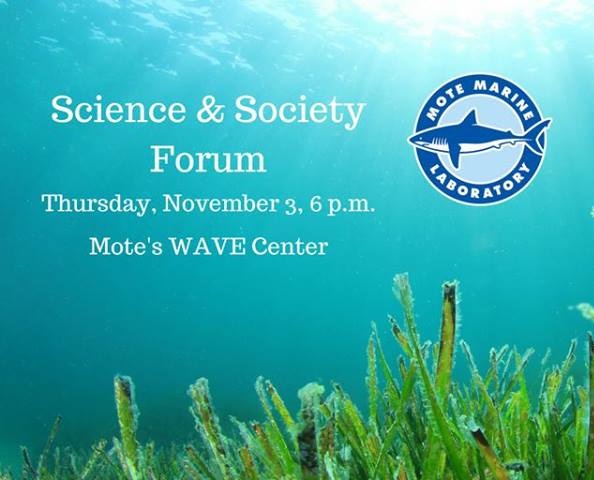Science and society forum Nov. 3 at Mote in Sarasota
Join Mote Marine Laboratory scientists, their colleagues from Japan, and several champions of citizen-science on Nov. 3 for a public forum on science and society, which will feature some of the latest successes and opportunities with citizen-science programs in Florida and beyond.
The Public Forum on “Sato-Umi”: Integration of Science and Community in Restoration, Monitoring and Sustainable Use of Marine Resources, will take place from 6 – 7:50 p.m. on Nov. 3 in the WAVE Center at Mote. Admission is free but seating is limited.
Sato-Umi — a concept that originated in Japan and is gaining ground around the world — is the harmony between human communities and the productivity and biodiversity of marine ecosystems. The concept offers major benefits for Sarasota Bay, from restoring depleted scallop populations to enhancing key fisheries.
The Nov. 3 Sato-Umi forum is part of a global study of science and society led by Japan’s Research Institute for Humanity and Nature (RIHN) titled “Formation of Local Environmental Knowledge Systems for Creation and Sustainable Governance of New Commons.” The study examines how grassroots groups, researchers working in the same area, policymakers and others can blend traditional and scientific knowledge and techniques to restore, conserve and sustainably use natural resources.
In the global RIHN project, one case study investigates how Mote Marine Laboratory scientists exchange knowledge with local residents through a Community Based Shellfish Restoration Program focused on scallops in Sarasota Bay. Since its implementation in 2012, this multi-partner program has provided useful pilot data to support future research, conservation and restoration efforts in which scientists, the public, resource managers and other stakeholders can achieve more by working together.
The scallop project has involved many team efforts among scientists and citizen-science volunteers. For instance, high schoolers helped Mote scientists build scallop monitoring devices and prepare space for a scallop nursery, and people of many ages and backgrounds participated in annual Scallop Searches led by grassroots group Sarasota Bay Watch.
While working to benefit scallops, participants also completed Mote’s pilot surveys to provide useful data on scientist-community exchange for the RIHN project.
Program participants became more knowledgeable about threats to scallops. For instance, they were twice as likely to deem Florida red tide a “severe threat” to scallops — a more accurate understanding — after participating.
95 percent of participants “strongly agreed” that scientific knowledge is important and 45 percent strongly agreed that the community has useful knowledge, regarding environmental challenges. No responder deemed either knowledge base unimportant. This aligns with the Sato-Umi notion that both scientists and local residents have knowledge to share, for the good of local ecosystems.
All survey responders felt the scallop program was helping in some way to increase their knowledge about factors such as environmental quality of Sarasota Bay and the ways humans, nature and scallops affect it.
During the Nov. 3 forum at Mote, guests can hear updates about this project and several other exciting efforts using citizen-science and Sato-Umi concepts to support healthy natural resources for all those who depend on them.
Agenda
Public Forum on the Concept and Implementation of “Sato-Umi”: Integration of Science and Community in Restoration, Monitoring and Sustainable Use of Marine Resources
Mote Marine Laboratory, RIHN ILEK Project
6 p.m. Nov. 3 in the WAVE Center at Mote Marine Laboratory, 1600 Ken Thompson Parkway, City Island, Sarasota, FL 34236
6-6:05 p.m.: Opening remarks, Dr. Michael P. Crosby, President & CEO of Mote Marine Laboratory, Sarasota, Florida
6:05-6:25: Sato-Umi – collaborative actions of science and community to promote community-based sustainable management and use of marine resources, Dr. Tetsu Sato, Research Institute for Humanity and Nature, Kyoto, Japan
6:25-6:35: Overview of scallop restoration, Dr. Michael P. Crosby, President & CEO, Barbara Lausche, Director of the Marine Policy Institute, and Jim Culter, Senior Scientist and Benthic Ecology Program Manager at Mote Marine Laboratory
6:35-6:50: Community-based training and outreach, Al Jeffrey, Owner of Scuba Quest, Sarasota, Florida, and member of the Board of Directors of Sarasota Bay Watch
6:50-7:05: Two community-based, citizen-science networks – Observations of Coastal Ecosystems and Assessment Network (C-OCEAN) and BleachWatch established in the Florida Keys, Cory Walter, Staff Biologist at Mote Marine Laboratory on Summerland Key, Florida
7:05-7:20: Experiences from being a member of SCUBAnauts International – Guiding the next generation in personal development through involvement in marine science, underwater research activities, Paul Foisy, President of SCUBAnauts International, and Mia Foisy, High School SCUBAnaut.
7:20-7:50: Audience question-and-answer discussion
